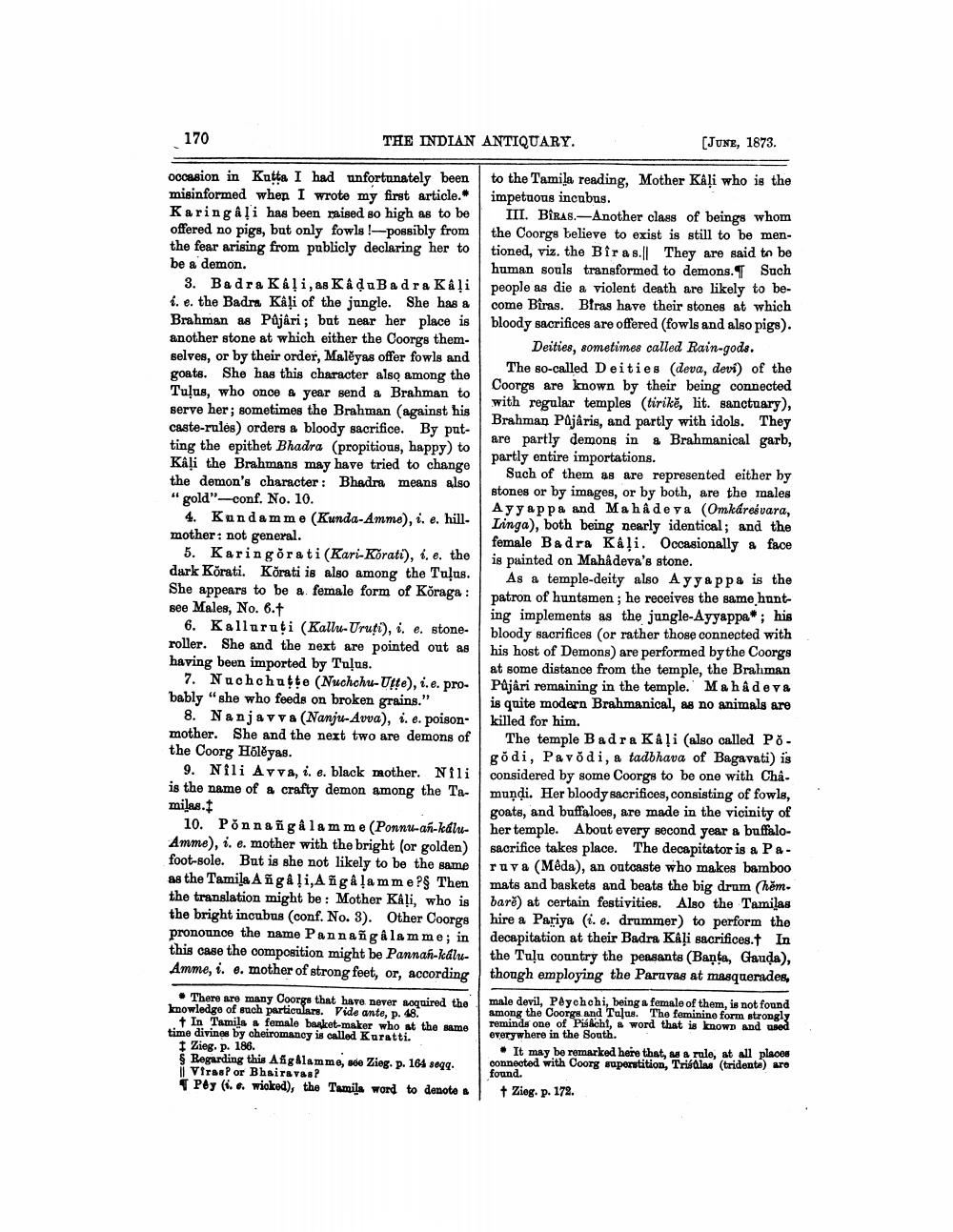________________
170
THE INDIAN ANTIQUARY.
occasion in Kutta I had unfortunately been misinformed when I wrote my first article.* Karingali has been raised so high as to be offered no pigs, but only fowls !-possibly from the fear arising from publicly declaring her to be a demon.
3. Badra Kali, as Kâ duBadra Kâli 4. e. the Badra Kali of the jungle. She has a Brahman as Pujâri; but near her place is another stone at which either the Coorgs themselves, or by their order, Maleyas offer fowls and goats. She has this character also among the Tulus, who once a year send a Brahman to serve her; sometimes the Brahman (against his caste-rules) orders a bloody sacrifice. By putting the epithet Bhadra (propitious, happy) to Kâli the Brahmans may have tried to change the demon's character: Bhadra means also "gold"-conf. No. 10.
4. Kundamme (Kunda-Amme), i. e. hillmother: not general.
5. Karingora ti (Kari-Kõrati), i. e. the dark Kōrati. Kõrati is also among the Tulus. She appears to be a female form of Kõraga: see Males, No. 6.t
6. Kalluruti (Kallu-Uruți), i. e. stoneroller. She and the next are pointed out as having been imported by Tulus.
7. Nuchchutte (Nuchchu-Utte), i. e. probably "she who feeds on broken grains."
8. Nanjavva (Nanju-Avva), i. e. poisonmother. She and the next two are demons of the Coorg Holeyas.
9. Nili Avva, i. e. black mother. Nili is the name of a crafty demon among the Tamilas.
10. Ponnañ gâlamme (Ponnu-an-káluAmme), i. e. mother with the bright (or golden) foot-sole. But is she not likely to be the same as the Tamila A ñ gâļi,Añgâlamme?§ Then the translation might be: Mother Kâli, who is the bright incubus (conf. No. 3). Other Coorgs pronounce the name Pannañ gâlamme; in this case the composition might be Pannan-káluAmme, i. e. mother of strong feet, or, according
There are many Coorgs that have never acquired the knowledge of such particulars. Vide ante, p. 48.
+ In Tamila a female basket-maker who at the same time divines by cheiromancy is called Kuratti.
[JUNE, 1873.
to the Tamila reading, Mother Kâli who is the impetuous incubus.
III. BIRAS. Another class of beings whom the Coorgs believe to exist is still to be mentioned, viz. the Biras. They are said to be human souls transformed to demons. Such people as die a violent death are likely to become Bîras. Biras have their stones at which
bloody sacrifices are offered (fowls and also pigs).
Zieg. p. 186.
Regarding this Afig&lamme, see Zieg. p. 164 seqq. Viras? or Bhairavas?
Pey (i. . wicked), the Tamila word to denote a
Deities, sometimes called Rain-gods. The so-called Deities (deva, devi) of the Coorgs are known by their being connected with regular temples (tirike, lit. sanctuary), Brahman Pajâris, and partly with idols. They are partly demons in a Brahmanical garb, partly entire importations.
Such of them as are represented either by stones or by images, or by both, are the males Ayyappa and Mahadeva (Omkaresvara, Linga), both being nearly identical; and the female Badra Kali. Occasionally a face is painted on Mahadeva's stone.
As a temple-deity also Ayyappa is the patron of huntsmen; he receives the same hunting implements as the jungle-Ayyappa*; his bloody sacrifices (or rather those connected with his host of Demons) are performed by the Coorgs at some distance from the temple, the Brahman Pâjâri remaining in the temple. Mahadeva is quite modern Brahmanical, as no animals are killed for him.
The temple Badra Kali (also called Pŏgodi, Pavodi, a tadbhava of Bagavati) is considered by some Coorgs to be one with Châmundi. Her bloody sacrifices, consisting of fowls, goats, and buffaloes, are made in the vicinity of her temple. About every second year a buffalosacrifice takes place. The decapitator is a Paruva (Mêda), an outcaste who makes bamboo mats and baskets and beats the big drum (hembare) at certain festivities. Also the Tamilas hire a Pariya (i. e. drummer) to perform the decapitation at their Badra Kâli sacrifices.† In the Tulu country the peasants (Banta, Gauda), though employing the Paruvas at masquerades,
male devil, Peychchi, being a female of them, is not found among the Coorgs and Tulus. The feminine form strongly reminds one of Pisachi, a word that is known and used everywhere in the South.
It may be remarked here that, as a rule, at all places connected with Coorg superstition, Trisalas (tridente) are
found.
+ Zieg. p. 172.




